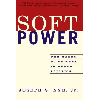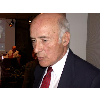| Titre : |
Soft power : the means to success in world politics |
| Type de document : |
texte imprimé |
| Auteurs : |
Joseph S. Nye (1937-....), Auteur |
| Editeur : |
New York : Public affairs |
| Année de publication : |
2004 |
| Importance : |
XVI-191 p. |
| Format : |
25 cm |
| ISBN/ISSN/EAN : |
978-1-58648-225-1 |
| Note générale : |
Notes bibliogr. Index |
| Langues : |
Anglais (eng) |
| Catégories : |
1 Sciences sociales et humaines:1.10 Géopolitique:Théorie
2 Histoire, géographie:2.65 Pays et ensembles de pays: Amériques et Caraïbes:États-Unis
4 Sciences politiques et administratives:4.10 Relations internationales:Relations internationales:Relations internationales 20e siècle
|
| Mots-clés : |
pouvoir États-Unis Relations internationales |
| Index. décimale : |
327.73 Relations extérieures- États-Unis |
| Résumé : |
Joseph Nye coined the term "soft power" in the late 1980s. It is now used frequently—and often incorrectly—by political leaders, editorial writers, and academics around the world. So what is soft power? Soft power lies in the ability to attract and persuade. Whereas hard power—the ability to coerce—grows out of a country's military or economic might, soft power arises from the attractiveness of a country's culture, political ideals, and policies.
Hard power remains crucial in a world of states trying to guard their independence and of non-state groups willing to turn to violence. It forms the core of the Bush administration's new national security strategy. But according to Nye, the neo-conservatives who advise the president are making a major miscalculation: They focus too heavily on using America's military power to force other nations to do our will, and they pay too little heed to our soft power. It is soft power that will help prevent terrorists from recruiting supporters from among the moderate majority. And it is soft power that will help us deal with critical global issues that require multilateral cooperation among states. That is why it is so essential that America better understands and applies our soft power. This book is our guide. |
| Note de contenu : |
At the 2003 World Economic Forum in Davos, Switzerland, George Carey, former Archbishop of Canterbury, asked Secretary of State Colin Powell why the United States seemed to focus only on its hard power rather than its soft power. Secretary Powell correctly replied that the United States had needed hard power to win World War II, but he politely reminded the skeptics: "And what followed immediately after hard power? Did the United States ask for dominion over a single nation in Europe? No. Soft power came in the Marshall Plan."
In fact, the Marshall Plan was a source of both hard and soft power, providing economic inducements as well as making America more attractive to the Western world. And, of course, the attraction of those ideas and values was crucial to the American victory in the Cold War. The Soviet Union held appeal in many parts of Western Europe after World War II, but it squandered its soft power with repressive policies at home and its invasions of Hungary and Czechoslovakia.
What is soft power? It is the ability to get what you want through attraction rather than coercion or payments. Think of the impact of Franklin Roosevelt's Four Freedoms in Europe at the end of World War II; of young people behind the Iron Curtain listening to American music and news on Radio Free Europe; of Chinese students symbolizing their protests in Tiananmen Square by creating a replica of the Statue of Liberty; of newly liberated Afghans in 2001 asking for a copy of the Bill of Rights; of young Iranians today surreptitiously watching banned American videos and satellite television broadcasts in the privacy of their homes.
When you can get others to want what you want, you do not have to spend as much on sticks and carrots to move them in your direction. Seduction is always more effective than coercion, and many values like democracy, human rights, and individual opportunities are deeply seductive. But attraction can turn to repulsion if we are arrogant and destroy the real message of our deeper values. |
Soft power : the means to success in world politics [texte imprimé] / Joseph S. Nye (1937-....), Auteur . - New York (250 West 57th Street, Suite 1321, 10107) : Public affairs, 2004 . - XVI-191 p. ; 25 cm. ISBN : 978-1-58648-225-1 Notes bibliogr. Index Langues : Anglais ( eng)
| Catégories : |
1 Sciences sociales et humaines:1.10 Géopolitique:Théorie
2 Histoire, géographie:2.65 Pays et ensembles de pays: Amériques et Caraïbes:États-Unis
4 Sciences politiques et administratives:4.10 Relations internationales:Relations internationales:Relations internationales 20e siècle
|
| Mots-clés : |
pouvoir États-Unis Relations internationales |
| Index. décimale : |
327.73 Relations extérieures- États-Unis |
| Résumé : |
Joseph Nye coined the term "soft power" in the late 1980s. It is now used frequently—and often incorrectly—by political leaders, editorial writers, and academics around the world. So what is soft power? Soft power lies in the ability to attract and persuade. Whereas hard power—the ability to coerce—grows out of a country's military or economic might, soft power arises from the attractiveness of a country's culture, political ideals, and policies.
Hard power remains crucial in a world of states trying to guard their independence and of non-state groups willing to turn to violence. It forms the core of the Bush administration's new national security strategy. But according to Nye, the neo-conservatives who advise the president are making a major miscalculation: They focus too heavily on using America's military power to force other nations to do our will, and they pay too little heed to our soft power. It is soft power that will help prevent terrorists from recruiting supporters from among the moderate majority. And it is soft power that will help us deal with critical global issues that require multilateral cooperation among states. That is why it is so essential that America better understands and applies our soft power. This book is our guide. |
| Note de contenu : |
At the 2003 World Economic Forum in Davos, Switzerland, George Carey, former Archbishop of Canterbury, asked Secretary of State Colin Powell why the United States seemed to focus only on its hard power rather than its soft power. Secretary Powell correctly replied that the United States had needed hard power to win World War II, but he politely reminded the skeptics: "And what followed immediately after hard power? Did the United States ask for dominion over a single nation in Europe? No. Soft power came in the Marshall Plan."
In fact, the Marshall Plan was a source of both hard and soft power, providing economic inducements as well as making America more attractive to the Western world. And, of course, the attraction of those ideas and values was crucial to the American victory in the Cold War. The Soviet Union held appeal in many parts of Western Europe after World War II, but it squandered its soft power with repressive policies at home and its invasions of Hungary and Czechoslovakia.
What is soft power? It is the ability to get what you want through attraction rather than coercion or payments. Think of the impact of Franklin Roosevelt's Four Freedoms in Europe at the end of World War II; of young people behind the Iron Curtain listening to American music and news on Radio Free Europe; of Chinese students symbolizing their protests in Tiananmen Square by creating a replica of the Statue of Liberty; of newly liberated Afghans in 2001 asking for a copy of the Bill of Rights; of young Iranians today surreptitiously watching banned American videos and satellite television broadcasts in the privacy of their homes.
When you can get others to want what you want, you do not have to spend as much on sticks and carrots to move them in your direction. Seduction is always more effective than coercion, and many values like democracy, human rights, and individual opportunities are deeply seductive. But attraction can turn to repulsion if we are arrogant and destroy the real message of our deeper values. |
|


 Affiner la recherche
Affiner la recherche


 327 Relations internationales, Diplomatie, Espionnage et services secrets
327 Relations internationales, Diplomatie, Espionnage et services secrets


